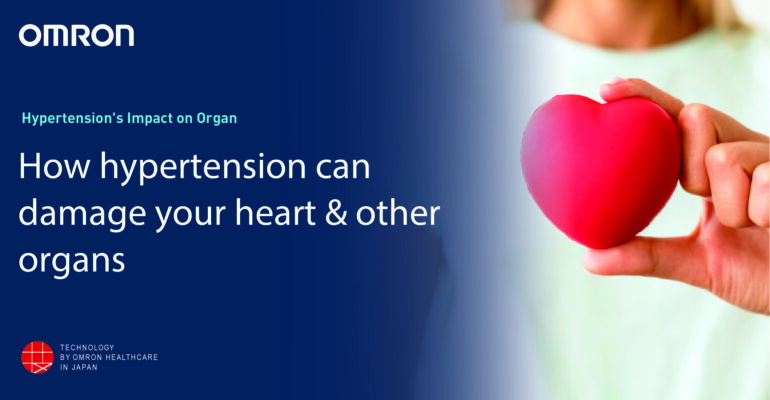How hypertension can damage your heart and other organs
July 2, 2023 2023-12-23 21:39How hypertension can damage your heart and other organs

How hypertension can damage your heart and other organs
Hypertension is a chronic condition affecting millions worldwide. It is crucial to understand the impact of hypertension on various organs and take proactive steps to mitigate its damaging effects. This article explores the nature of hypertension, its symptoms, causes, diagnosis, and treatment options. Additionally, we will delve into the organs and body systems affected by hypertension and highlight the importance of monitoring heart health and making lifestyle changes. Omron’s devices will also be discussed, as they offer valuable support in managing hypertension and promoting overall well-being.
Understanding Hypertension
Hypertension is a medical condition characterized by elevated blood pressure levels. While it may not always present noticeable symptoms, it is a significant risk factor for various health complications. Understanding hypertension involves knowing its causes, symptoms, and diagnosis methods. Treatment options may include lifestyle modifications, such as dietary changes, increased physical activity, stress management, and medication when necessary.
- Hypertension is the major reason for stroke, heart disease, kidney disease, and other health problems. Hypertension in India is estimated to be 25% in rural areas and 33% in urban areas. Cerebrovascular disease (stroke) is India’s second leading cause of death. Estimation of around 5.5 million people in India suffer from stroke each year.[1] [2] [3]
- Chronic kidney disease (CKD) is India’s major public health problem. It is estimated that 28 million people in India have CKD. [4]
- Retinal diseases like diabetic retinopathy and hypertensive retinopathy are common in India. The diseases can lead to blindness if not treated in time.
- Peripheral artery disease (PAD) Arteries that carry blood to the legs and feet are narrowed or blocked. PAD is more common in people with hypertension.
In addition to these diseases, hypertension can also increase the risk of other health problems, such as:
- Aneurysm
- Atrial fibrillation
- Depression
- Dementia
- Preeclampsia
The Impact of Hypertension on Organs and Body Systems
Hypertension can have damaging effects on various organs and body systems, including:
- Heart: Persistent high blood pressure places increased strain on the heart, leading to the thickening of the heart muscle (left ventricular hypertrophy) and an increased risk of heart conditions, heart failure, and heart attacks.
- Blood Vessels: Elevated blood pressure damages blood vessels, making them narrower and less elastic. It can lead to the formation of blood clots, atherosclerosis (plaque buildup), and an increased risk of stroke and peripheral artery disease.
- Kidneys: Hypertension can damage the small blood vessels in the kidneys, impairing their ability to filter waste products from the blood. If left untreated, it can lead to chronic kidney disease or even kidney failure.
- Brain: Uncontrolled hypertension increases the risk of strokes, transient ischemic attacks (mini strokes), and vascular dementia. It can also contribute to cognitive decline and memory problems.
Taking Care of Your Heart Health and Changing Your Lifestyle
Caring for your heart health and making positive lifestyle changes are crucial for managing hypertension:
- Monitoring Blood Pressure: Regularly monitor your blood pressure at home using a reliable and accurate blood pressure monitor. This helps you stay informed about your condition and enables early detection of any concerning changes.
- Adopting a Healthy Diet: Embrace a balanced diet rich in fruits, vegetables, whole grains, lean proteins, and low-fat dairy products. Limit sodium intake, avoid processed foods, and reduce the consumption of saturated and trans fats.
- Engaging in Physical Activity: Regular exercise is beneficial for managing hypertension. Aim for two and half hours of moderately intense aerobic activity per week, such as brisk walking, cycling, or swimming. [5]
- Stress Management: Practice stress-reducing techniques like meditation, deep breathing exercises, yoga, or engaging in hobbies. Work on reducing your stress levels as it can have a positive impact on all aspects of body & blood pressure control.
- Limiting Alcohol and Caffeine: Excessive alcohol consumption and caffeine intake can elevate blood pressure. Moderate your alcohol consumption and be mindful of your caffeine intake.
- Quitting Smoking: Smoking damages blood vessels, increases blood pressure, and significantly raises the risk of heart disease. Seek support from healthcare professionals or support groups to quit smoking successfully.
Omron’s Support in Managing Hypertension
Omron offers a range of devices that provide valuable support in managing hypertension and maintaining heart health. Their accurate and user-friendly blood pressure monitors empower individuals to regularly monitor their blood pressure in the comfort of their homes. This allows for better tracking of blood pressure trends, facilitating informed discussions with healthcare providers.
Additionally, Omron’s innovative wearable devices, such as smartwatches and activity trackers, help individuals monitor their physical activity levels, sleep patterns, and overall well-being. These devices provide insights into daily activity goals, encouraging a more active lifestyle and supporting hypertension management.
Hypertension can have far-reaching consequences, affecting vital organs and body systems. Understanding the impact of hypertension on the heart, blood vessels, kidneys, and brain is crucial for managing the condition effectively. By monitoring blood pressure, adopting a healthy lifestyle, and making positive changes, individuals can take control of their heart health and reduce the risks associated with hypertension. Omron’s devices provide valuable support in managing hypertension, allowing for convenient and accurate blood pressure monitoring and promoting an active and healthy lifestyle. With proactive management and a commitment to a heart-healthy lifestyle, individuals can safeguard their well-being and improve their overall quality of life.
References:
- High blood pressure (hypertension) – Symptoms & causes – Mayo Clinic
- Hypertension in India: a systematic review and meta-analysis of prevalence, awareness, and control of hypertension. – Abstract – Europe PMC
- Incidence & prevalence of stroke in India: A systematic review – PMC (nih.gov)
- Chronic Kidney Disease in India – PMC (nih.gov)
- Getting Active to Control High Blood Pressure | American Heart Association






